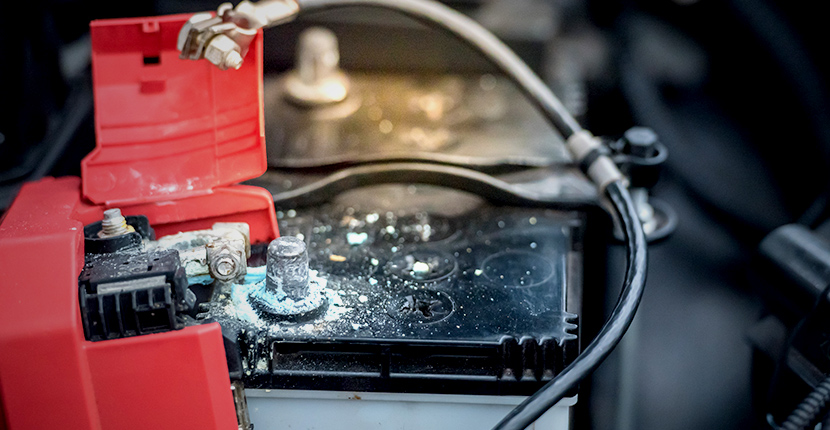What is Car Battery Corrosion & How To Prevent It?
- by Joe Weber - updated on 7/1/2024

If you're looking under the hood of your vehicle to maintain your battery (as you should), at some point, you might have noticed a buildup of white, green or blue crystal-like material on your battery terminals.
This buildup is a very common phenomenon called battery corrosion and it can have a serious impact on your battery's ability to start your car. So what does it mean when you have corrosion on your car battery? Keep reading for useful tips on what causes corrosion and what you can do to prevent it.
What is Car Battery Corrosion?
As a battery ages, the sulfuric acid within the battery lets off small amounts of gas. When this gas comes into contact with the metal terminals, it interacts with the oxygen in the air, resulting in the formation of sulfuric acid crystals. These crystals eventually combine with airborne moisture, resulting in the powdery green, blue or white substance we know as battery corrosion.
What Causes Battery Corrosion?
Corrosion can be caused by several different things. Lead acid auto batteries contain a number of different components that react with one another chemically to produce the electricity necessary to start your engine (for more info, read about How a Car Battery Works).
The most common cause of corrosion occurs as the battery vents sulfuric acid vapor and hydrogen gas. These gasses react with the heat underneath your hood and the metal on the outside of the battery causing a chemical reaction with the lead alloy terminal.
Other causes of corrosion include
- Too much water in your battery's electrolyte solution
- Overcharging the battery.
- Age. It's very common for a battery to begin corroding as it gets older, particularly if it's over five years old.
What does the color of the corrosion mean?
The color of the corrosive buildup can tell you a lot about what is causing your battery to corrode in the first place.
- White or gray corrosion is caused by a battery that's leaking excessive battery acid due to a crack in the battery's casing.
- Green corrosion is caused by oxidation within the battery's copper cable.
- Blue corrosion signifies the presence of copper sulfate which results when the copper terminal clamps are exposed to hot sulfuric acid. Blue corrosion is usually present when both of the above issues are present.
What Problems Can Corroded Battery Terminals Cause?
Corrosion creates a poor connection between the clamps and the battery limiting the amount of power that can travel from the battery to the starter and from the charging system back into the battery. This poor connection can make it difficult to start your engine and lead to premature failure of the battery due to inefficient recharging.
Special Note
Corrosion can also occur when moisture makes its way into your vehicle's electrical and power delivery system. This can damage electrical components, such as your vehicle's air conditioning or any other system that runs off of electricity.
Remove Corrosion When You See It
Leaving corrosion unchecked can seem like a minor thing but it can end up causing some major concerns in the end. The best thing to do is remove corrosion as early as possible to keep the effects of corrosion from showing their ugly faces. Learn how to properly clean battery terminals with our easy-to-follow guide to removing battery corrosion.
How Do You Prevent Car Battery Corrosion?
Batteries Plus offers several products that can help prevent your battery from corroding. An anti-corrosion spray will coat the terminals in a soft protective coating that helps neutralize surface acids and salts. A battery terminal protector will absorb vapors at the base of the post and help prevent them from reaching the battery terminals. Or, get all of it together in a nice package with the Terminal Protection Kit that comes with a cleaner, brush, anti-corrosion spray and terminal protectors.
If you store your car or truck for longer periods and use a charger to maintain proper charge levels on your battery, be sure that the charger output voltage matches the voltage of your vehicle's battery and it's compatible with your battery's chemistry. Automatic chargers are a great option, and nowadays most common, because they will monitor the charge and adapt its output so you can leave it connected at all times.
Suppose you do not have an automatic charger that shuts itself off when the battery reaches its optimum charge. In that case, you'll also need to monitor the charging process to make sure it is turned off or disconnected when the battery reaches a full charge so it doesn't overcharge the battery.
Batteries Plus Offers Free Battery Testing
If you are experiencing frequent battery corrosion or noticing problems with the battery dying quickly, stop by your nearest Batteries Plus and have it tested for free by our battery experts.
After your battery is tested, you may find that you need a replacement. Our friendly battery experts will help you find a battery that suits your vehicle and your driving patterns.
Shop our selection of car and truck batteries online or in-store and be sure to take advantage of our battery installation service (Available at most locations on most vehicle makes and models. Fees may vary from location to location or the difficulty of the installation.). Plus, we offer a selection of additional essentials for your car or truck in our Automotive Center.